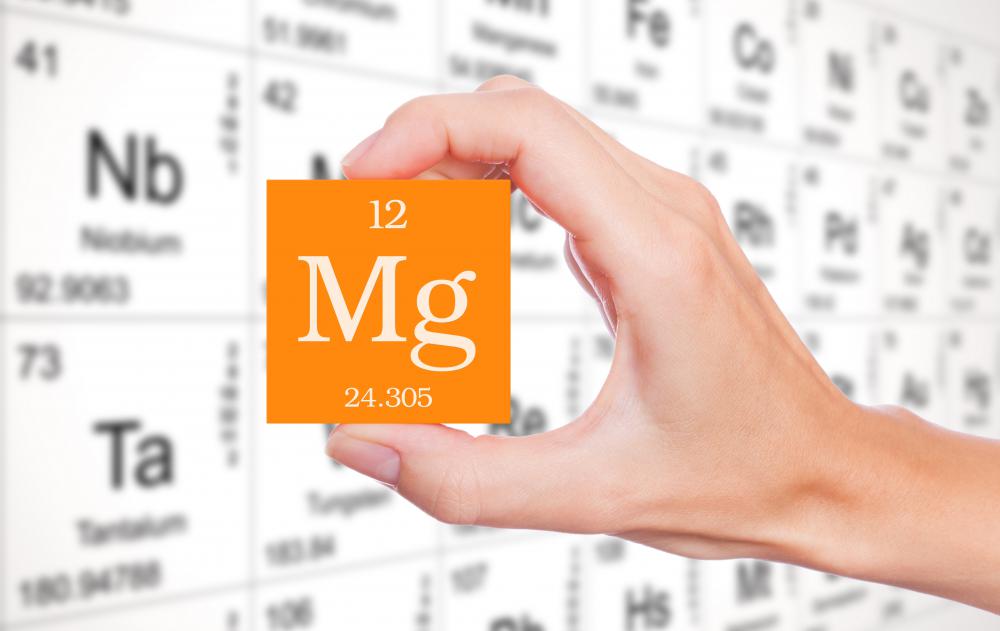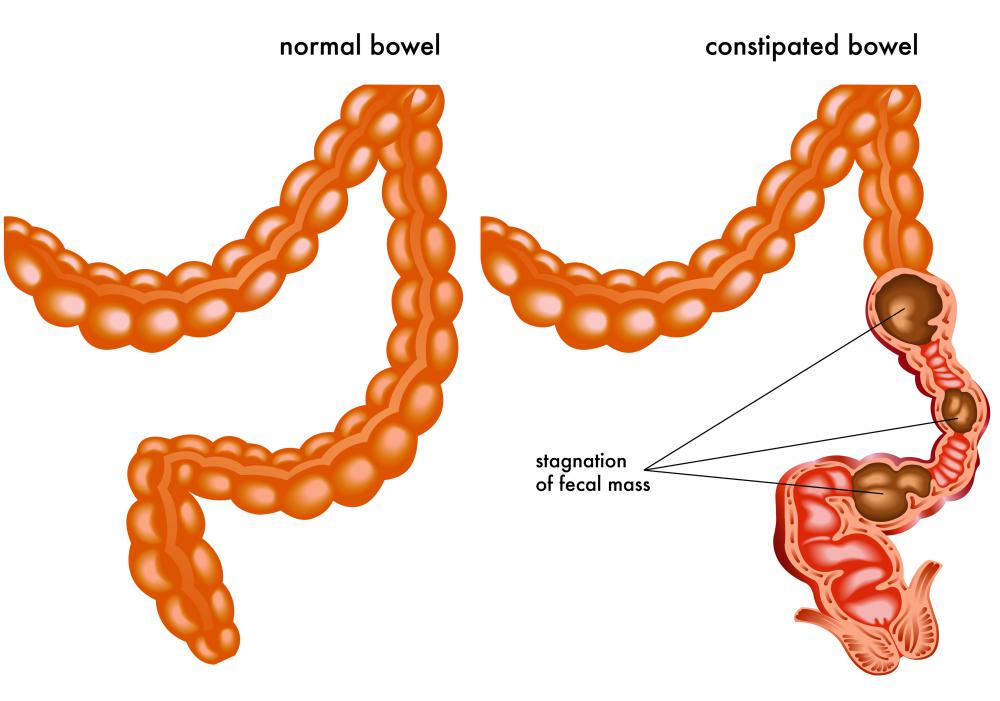At WiseGEEK, we're committed to delivering accurate, trustworthy information. Our expert-authored content is rigorously fact-checked and sourced from credible authorities. Discover how we uphold the highest standards in providing you with reliable knowledge.
How do I Use Magnesium for Constipation?
Using magnesium for constipation requires more than simply choosing the correct supplement and dosage. To correctly use magnesium to relieve constipation, you need to take into account the type of supplement, the recommended amount and any medications you may already be taking—even if they are not for constipation. You may also want to consult your physician if you plan to use magnesium on a regular basis to treat chronic constipation.
To alleviate constipation, magnesium works in two different ways. The first is by relaxing the muscles within the intestines to allow the passing of excrement. Magnesium also works by attracting water to cells and the intestines, making stool softer and making it easier to pass.

It is generally a good idea to take a supplement which consists solely of magnesium for constipation. Many supplements combine this mineral with others such as calcium, but calcium has a binding effect, which may worsen constipation, and other minerals or vitamins may also cause complications. Some choose to take a daily supplement of magnesium, while others only take it when needed. These supplements normally come in the form of pills, liquid, and powder.

One common way to take magnesium for treating constipation as needed is to use magnesium sulfate. The common name for this is Epsom salt, and it generally provides relief very quickly. To do this, you may mix 1 to 2 teaspoons (about 10 grams) of the magnesium sulfate into 4 to 8 ounces (120 to 480 mL) of cold water. Drink the whole mixture in one sitting. It may also be a good idea to have a follow-up drink, as the taste is not particularly pleasant.

Many over-the-counter medications also contain magnesium for constipation. It is important to use these medications only as directed. It is also beneficial to note that milk of magnesia is not a magnesium supplement and is intended for fast relief rather than use as an on-going treatment. Milk of magnesia is generally considered less safe than magnesium supplements and should be used very rarely.

There are cautions to using magnesium for constipation. Certain medications and ailments, particularly those involving the kidneys, may prohibit the use of magnesium. The use of magnesium sulfate for constipation should also not exceed once or twice a week even in those users without any ailments or medications, as this product can cause poisoning of the blood if used too often. It is never wise to use a supplement in any way other than as directed by the bottle or a medical professional.
AS FEATURED ON:
AS FEATURED ON:

















Discussion Comments
I learned a long time ago the correlation between magnesium and constipation. The cheapest and quickest remedy I have found is using the Epsom salt.
Many people think this is only good for soaking your feet or to help relieve the pain of sore muscles. Most people don't think about drinking it, but that is the best thing I have found for occasional constipation.
It is not something that you ever get used to the taste of, but it works. I would not say it is bad tasting, it just leaves something to be desired.
One glass of this and this is usually all I need to get back to normal. I like to follow this up with a little bite of something sweet to get the salty taste out of my mouth.
I have never had to buy any magnesium supplements as long as I keep some Epsom salt on hand.
@kylee07drg - My calcium supplement also contains magnesium. I have read in many places that the magnesium helps your body absorb the calcium. Otherwise, you are not getting the benefits you are hoping for from the calcium supplement.
Sometimes this seems like a vicious circle. I am not constipated very often, so I keep some magnesium supplements on hand when I am constipated.
For me, this was the best way to deal with it. I didn't want to give up the magnesium in the calcium supplement. When I am constipated and am taking the magnesium supplement, I just don't take my calcium for a few days.
It is beneficial to know the relationship between calcium and magnesium. Sometimes you think you are doing the right thing, only to find out you are doing just the opposite.
For the longest time, I have been taking supplements that contain both magnesium and calcium. I had come to believe that magnesium wasn't good at treating or preventing constipation at all, because I had no idea that the calcium could be canceling out its ability to give me a bowel movement!
I'm glad I know this now. I hate using laxatives, and I would rather use something to prevent constipation rather than to cure it.
I am going to seek out a pure magnesium supplement. Hopefully, it will do what I originally thought the other one would do.
I use a magnesium liquid when I need relief from constipation, but I am not allowed to take it on a regular basis. I have a kidney disease, and it could potentially accumulate in my organs and poison me.
A few years ago, my disease progressed to the point that my kidney function declined. They can no longer effectively filter out toxins in my body, so anything I take could potentially be dangerous.
However, using it once in a great while to provide gentle relief doesn't seem to hurt me. I use the lowest dose possible that will still be effective, and I haven't felt sick at all from using it.
@ddljohn-- As far as I know, there are several different kinds of magnesium tablets and powders available over the counter but some work better as a remedy for constipation than others. Magnesium citrate is the main one used for constipation and is pretty strong. It's used a lot in hospitals to clean out a patient's bowels before surgery. Magnesium amino acid chelate is also a magnesium and is very rich in amino acids. It's mainly used as a supplement and mostly for deficiencies than constipation. Magnesium oxide, on the other hand, is not the magnesium we're talking about. It's milk of magnesia.
I'm not against the use of magnesium citrate for constipation. But I don't think it should be used regularly since it's a rather intense way to promote bowel movements. It's not meant to maintain regularity. I think it should only be used once in a while when nothing else works. It would be better to call magnesium citrate a laxative rather than a supplement for that reason.
@ddljohn-- I'm not an expert so don't take my word on it but as far as I know 300 mg is generally the recommended dose for taking magnesium supplements for constipation relief. Some people might need to take a little bit more or little bit less.
I don't think anything less than 200 mg would work and 500 mg will probably be too much. I take 300 mg daily with lunch and my constipation is gone. I did overdose myself one day because I forgot that I took the supplement and took another one. I got diarrhea that day. Diarrhea and stomach cramps basically means that you took too much.
Of course, ask your doctor and follow what he or she suggests. But if you decide to start on it beforehand, you can start with 200 mg and work your way up to 300 until it starts working for you. I don't take any other supplements with it. But yes, I do eat lots of veggies and fruits, drink plenty of water and also exercise regularly.
There seems to be a lot of confusion about the use of magnesium citrate for constipation. I heard about magnesium on a TV program and have been reading about it on various forums.
I've heard so many different things about the dose and how it should be taken. People seem to be taking anywhere from 200 mg to 500 mg daily. Some take it as a single dose and some as multiple doses with each meal. Some say to support it with lots of fiber and water. Others say to take it with calcium and other vitamins.
I'm so confused! I'm going to ask my doctor about it at my next visit but can the dose and method of using magnesium supplements be really so different for different people?
Can anyone qualified on this subject tell me what the most common and safe dose and method is?
Post your comments